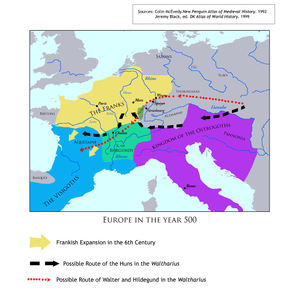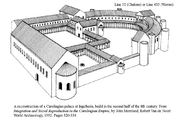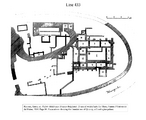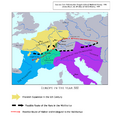Waltharius419
Flight of Walther and Hildegund to the area of Worms (419–435)
| Waltharius fugiens, ut dixi, noctibus ivit, | DDSSDS | |||||
| Atque die saltus arbustaque densa requirens | 420 | DSSDDS | ||||
| Arte accersitas pariter capit arte volucres, | SSDDDS Elision: arte accersitas |
|||||
| Nunc fallens visco, nunc fisso denique ligno. | Fisso…ligno: a kind of trap for birds, consisting of a piece of green wood split down the middle with the two halves held apart at one end, such that when a bird arrives, attracted by bait scattered in the middle, the two halves will snap together and break its legs.
|
Georgics 1.139-140.: tum laqueis captare feras et fallere visco/ inventum. ‘Then was discovered how to catch game with traps and to snare birds with lime.’ Aeineid 9.413-414.: hasta. . .fisso transit praecordia ligno. ‘The spear pierces the midriff with the broken wood.’
|
SSSSDS | |||
| Ast ubi pervenit, qua flumina curva fluebant, | Georgics 2.11-12.: camposque et flumina late/ curva tenent. ‘Far and wide they claim the plains and winding rivers.’
|
DSSDDS | ||||
| Immittens hamum rapuit sub gurgite praedam. | Georgics 4.395: sub gurgite. . . ‘Beneath the wave. . .’
|
SSDSDS | ||||
| Atque famis pestem pepulit tolerando laborem. | 425 | DSDDDS | ||||
| Namque fugae toto se tempore virginis usu | Virginis usu: The poet praises Waltharius for abstaining from sexual intercourse.
|
DSSDDS | ||||
| Continuit vir Waltharius laudabilis heros. | DSDSDS | |||||
| Ecce quater denos sol circumflexerat orbes, | Quater denos: the length of time is perhaps of biblical inspiration.
|
Aeineid 5.131: circumflectere cursus. . . ‘To double round the courses. . .’
|
DSSSDS | Walther and Hildegund wander in the wilderness between the land of the Huns and the territory of Worms for forty days, a period which echoes the wandering of the Jews prior to their entrance into the Promised Land (cf. Exodus, Leviticus, Numbers, Deuteronomy), the period of Christ’s temptation in the desert (cf. Matthew 4:1-11; Mark 1:13-14; Luke 4:1-15), and the length of Lent. The specification of forty days is no accident, but as usual in the poem, the function of such a religious reference is unclear.
It may imply a spiritual significance to Walter’s ordeal, fulfilled in the “justice” meted out by the poem’s peculiar ending. Similarly if Walter and Hildegund’s journey functions as a kind of Lent, then Walther’s bloody battle might constitute an analogue to Good Friday or other older and more indigenous tales of human sacrifice and rebirth. Indeed, after passing through the carnage and loss of Walther’s single combat, order, friendship, and loyalty are reborn and restored in a kind of resurrection. The time specification may also emphasize that the Waltharius is a tale preliminary to Walter’s illustrious rule, much as the wanderings of Christ or the Israelites in the desert forms a prelude to a well-known, public career. Alternatively, the specification of forty days may simply function as yet another religious “ghost” in the poem, like the references to fauns (ll. 761-763) or Wieland (ll. 965-966) MCD | ||
| Ex quo Pannonica fuerat digressus ab urbe. | SDDSDS | |||||
| Ipso quippe die, numerum qui clauserat istum, | 430 | SDDSDS | ||||
| Venerat ad fluvium iam vespere tum mediante, | Vespere…mediante equiv. to medio vespere
|
Secundum Iohannem 7.14: iam autem die festo mediante. . . ‘Now about the midst of the feast. . .’
|
DDSDDS | |||
| Scilicet ad Rhenum, qua cursus tendit ad urbem | Rhenum: the Rhine River.
|
Aeineid 5.834: cursum contendere iussi. ‘They are bidden to shape their course.’ 12.909: nequiquam avidos extendere cursus/ velle videmur. ‘We seem to strive in vain to press on our eager course.’
|
DSSSDS | |||
| Nomine Wormatiam regali sede nitentem. | Wormatiam: Worms, a city on the Rhine in present-day Germany, here the capital (regali sede) of the Franks, now ruled by Gunther. The route that Waltharius is taking home is a very circuitous one.
|
|
DDSSDS | |||
| Illic pro naulo pisces dedit antea captos | Naulo: “fare” for being ferried across the river.
|
Iona Propheta 1.3: et invenit navem euntem in Tharsis et dedit naulum eius. ‘And he found a ship going to Tharsis: and he paid the fare thereof.’
|
SSSDDS | |||
| Et mox transpositus graditur properanter anhelus. | 435 | SDDDDS |



